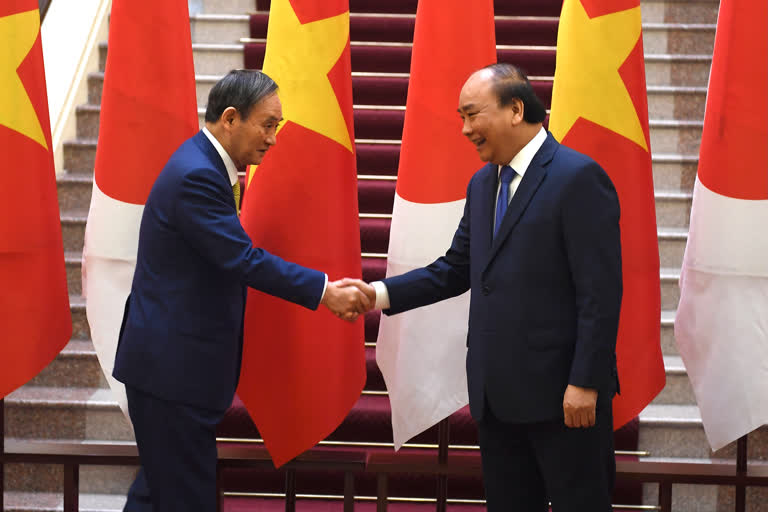Hanoi: Japanese Prime Minister Yoshihide Suga, in his first overseas summit since taking office last month, agreed with his Vietnamese counterpart to step up defense and security cooperation in the face of China's expanding influence in the region.
In talks in Hanoi on Monday, Suga and Vietnamese Prime Minister Nguyen Xuan Phuc set a basic agreement allowing Japan to export defense equipment and technology to Vietnam. Japan has been pursuing such pacts in recent years to bolster ties with Southeast Asia and sustain its defense industry.
Suga said his four-day trip to Vietnam and later Indonesia was key to pursuing multilateral economic and security cooperation to counter China’s growing power and protect sea lanes in disputed areas of the South China Sea.
“Vietnam is crucial to achieving our vision of ‘the Free and Open Indo-Pacific,’ and our valuable partner,’” Suga told a news conference after he meets with Phuc. “Japan, as an Indo-Pacific nation, will continue to contribute to the peace and stability in this region.”
Suga said Vietnam, at the centre of the region, was the most suitable destination for his first trip abroad as Japan’s leader.
Neither of the two leaders mentioned China by name in their news conference. Phuc said the peace and stability of the South China Sea should be protected by the rule of law, not unilaterally by force or threats.
"Vietnam appreciates that Japan, one of the world's leading powers, is actively contributing its efforts to maintain peace and stability in the region and the world,” Phuc said.
In a speech later Monday at Vietnam-Japan University, Suga said that Japan’s “Free and Open Indo-Pacific” concept and “ASEAN Outlook on the Indo-Pacific," formulated by the Association of Southeast Asian Nations in 2019, share values such as rule of law, openness, transparency and freedom.
Suga expressed strong support for their vision and said together Japan and ASEAN can achieve a peaceful and prosperous future.
“Unfortunately in this region, there is a move in the South China Sea that goes against the rule of law and openness stated in this ASEAN Outlook, and Japan strongly opposes any attempt that escalates tensions in the South China Sea,” Suga said in his speech, hinting at China's growing assertiveness in the area.
Read more: US, Australia, India, Japan discuss China's growing power
Japan already has defense equipment transfer deals with the U.S., Britain and Malaysia, among other countries. Vietnam is a 12th partner. In its first actual delivery of such exports, Japan in August exported a radar surveillance system to the Philippines.
Details of possible equipment sales were not mentioned, but Suga called the agreement “a major step” for bilateral defense cooperation, saying he expects further developments.
Japan partially lifted its ban on military equipment and technology transfer in 2014 as part of former Prime Minister Shinzo Abe’s efforts to build Japan’s defense capabilities.
Suga and Phuc signed other agreements to cooperate in a range of economic fields and on anti-terrorism measures.
The two sides also agreed to ease entry bans and allow short-term business visits and reopen flights between Vietnam and Japan. Such travel has been very tightly restricted due to the pandemic, but both countries have managed to somewhat stabilize COVID-19 outbreaks.
Suga also promised to provide support for Vietnamese workers in Japan affected by the pandemic's hit to the economy. Vietnamese accounts for more than half of the foreign worker's Japan has accepted in recent years to make up for its declining and ageing population.
Japan is one of Vietnam’s top trading partners with two-way trade of $28.6 billion so far this year. Japan is also Vietnam’s largest overseas aid donor, providing $23 billion as of 2019 and accounting for more than a quarter of Vietnam’s foreign loans.
The government has been trying to entice Japanese companies to invest in Vietnam and other Southeast Asian countries to leaven the country's dependence on manufacturing and other businesses in China.
In August, Vietnam agreed to buy six coast guard patrol boats worth $345 million from Japan. The country is seeking to improve its maritime defenses amid China’s continuing development and militarization of artificial islands in contested waters of the South China Sea.
Progress in talks between ASEAN and China over the disputes appears to be at a standstill.
Suga’s predecessor Abe also chose Vietnam as the first country he visited after taking office. Suga is the first foreign head of a state to visit Vietnam since the country closed its borders to contain COVID-19.
Also read: Campaign to succeed PM Abe as party leader begins in Japan
(With inputs from AP)



